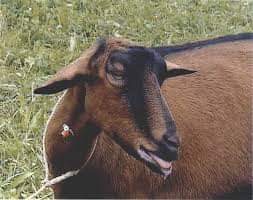Listeriosis in Goats
By Dr.Suprakash Mondal
Listeriosis is caused by the bacterium Listeria monocytogenes. The organism is found in soil, water, plant litter, silage and digestive tracts. The disease is contracted by feeding contaminated silage, sudden changes in feed, stresses of parasitism, dramatic weather changes and/or advanced stages of pregnancy. The source of infection in goats is often not found. Goat milk and goat products may be be source of infection for humans.
Signs of illness include
depression, decreased appetite, fever, leaning or stumbling, moving in one direction only, head pulled to flank with rigid neck, facial paralysis on one side, slack jaw and drooling. Abortions may also occur.
Treatment includes
administering high doses of penicillin under the direction of a veterinarian, anti-inflammatories, supportive therapy (fluids and electrolytes) and supplemental feeding.
Control measures include
isolating aborting does from the herd and raising kids separately. Handling aborted fetuses, placentas and reproductive discharges calls for gloves and face masks as well as careful disposal. Floors and pens should be thoroughly cleaned and disinfected. Humans should avoid drinking unpasteurized goat milk to help prevent contracting listeriosis.
Photo courtesy-Google


